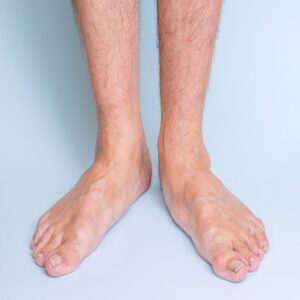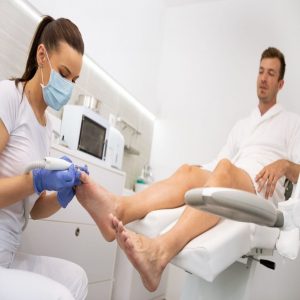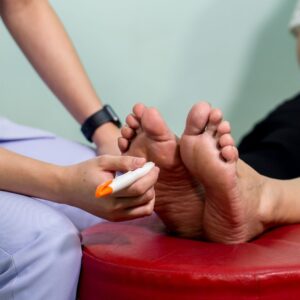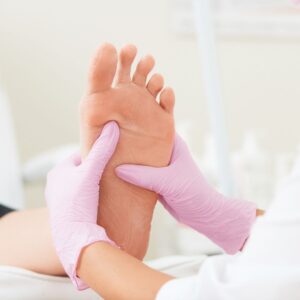Welcome to CEC Health Center!
Podiatrist in Deer Park That Accepts Medicaid

CEC Health Center – A Federally Qualified Health Center (FQHC)
The mission of CEC Health Center (CEC) is to provide high-quality, comprehensive healthcare to underserved community members with limited incomes including those with autism, learning and developmental disabilities, and behavioral and mental health concerns. Looking for a Podiatrist in Deer Park That Accepts Medicaid? Contact The CEC Health Center today for more information.
Overseen by culturally sensitive, credentialed medical staff, our patient-centered approach, high-quality primary and specialty services are provided regardless of a patient’s background or ability to pay.
Why CEC Health Center?
CEC provides a team-based approach by putting the patient at the center of their care. Using the highest standard of medical care we give the patients the tools they need to achieve a healthy lifestyle.
CEC Board Certified physicians provide more than healthcare, they provide life care.
Insurance & Payment
CEC accepts Medicare, Medicaid and all Medicaid Managed Care Plans and Commercial Insurance with out-of-network benefits. A sliding fee scale is available. For more information please contact our office at (516) 622-8888.
Office Hours & Locations
Nassau County
857 South Oyster Bay Road, Bethpage, NY 11714
(516) 622-8888
Monday through Thursday, 8:00 a.m. – 8:00 p.m.
Friday, 8:00 a.m. – 5:00 p.m
Glen Cove
113 Glen Cove Avenue, Glen Cove, NY 11542
(516) 622-8888
Suffolk County
305 Oser Avenue, Hauppauge, NY 11788
(516) 622-8888
Monday through Friday, 9:00 a.m. – 5:00 p.m
Chemical Dependency Clinic
Monday: 9:00 am – 8:00 pm
Tuesday: 8:00 am – 8:00 pm
Wednesday: 9:00 am – 8:00 pm
Thursday: 9:00 am – 8:00 pm
Friday: 9:00 am – 5:00 pm
Mental Health Clinic
Monday: 9:00 am – 5:00 pm
Tuesday: 9:00 am – 7:00 pm
Wednesday: 9:00 am – 7:00 pm
Thursday: 9:00 am – 7:00 pm
Friday: 9:00 am – 5:00 pm
Foot Strengthening Exercises
Do you experience aches and pains in your feet that make daily life difficult? Using our feet is vital to how we function. It is important to have strong feet that will get you through each day pain-free so you can be as active as possible. Are you looking for a podiatrist in deer park that accepts medicaid? Exercising and strengthening your feet can be confusing, but The CEC Health Center is here to help! We provide treatment, exercises, and guidance that will strengthen your feet for years.
Causes of Foot Pain
The wear and tear we put our feet through will lead to aches and soreness if we don’t take care of them. Athletes commonly experience foot pain, which can also hinder performance. Injuries or conditions such as arthritis and diabetes can cause weak and pain-stricken feet, but you should be aware of these before you begin treatment. As a podiatrist in deer park that accepts medicaid, we recommend that you come in for a visit.
Exercises To Strengthen the Feet
If you’re looking for a podiatrist in deer park that accepts medicaid and can help you with foot strengthening exercises, The CEC Health Center is the place for you. Whether you’re looking for pain relief or want to have stronger feet, some examples of quality foot strengthening exercises are listed below:
- Toe raise, point, and curl
- Toe extension
- Marble pickup
- Big-toe stretch
- Tennis ball roll
- Achilles stretch
- Sand Walking
It is Important to Warm Up Before and Avoid Painful Exercise/Stretching Sessions
Be sure to get the blood flowing in your feet before you do these exercises. If you’re doing them at home, take a walk around the house, take a quick walk or bike ride outside, or do whatever you need to get warmed up. It is also important to keep in mind that these exercises should not be painful. For example, don’t go so far if you feel pain while stretching.
Contact Our Podiatrist in Deer Park That Accepts Medicaid
We realize that doing these foot strengthening exercises on your own can be confusing, which is why we invite you to visit The CEC Health Center so that we can guide you on your way to stronger feet. If you want to strengthen your feet and are looking for a podiatrist in deer park that accepts medicaid, contact us today.
What Causes Flat Feet?
Feet pain is not easy to deal with and can worsen if it’s not treated correctly. Flat feet, also known as pes planus, is an example of a condition that can cause this pain. At CEC Health Center, we provide podiatry services! If you’re interested in seeing a podiatrist in deer park that accepts medicaid, please visit our facility today. Read more below to learn about flat feet.
Flat Feet
Individuals with flat feet have a different foot shape, including either low or no arch in the feet. The sole makes complete or near-complete contact with the floor. This condition develops when the tendons do not gather together to form an arch. There are two types of flat feet: flexible flat feet, commonly found in the pediatric population, and rigid flat feet, which are developed in adulthood. We have a podiatrist in deer park that accepts medicaid at our facility to solve any of your flat feet problems. Read below to learn about the several causes and risks of flat feet:
- Injuries and fractures to the foot area
- Damaged tendons
- Obesity
- Diabetes
- Pregnancy
- Arthritis
Once you schedule your appointment with us, we will provide you with a proper evaluation and determine your diagnosis. We will obtain your medical history and observe your leg and feet movements. We will also do other forms of exams such as X-Rays, ultrasounds, CT-Scans, or an MRI. This will allow us to determine your condition and develop a treatment plan.
Treatment of Flat Feet
Flat feet should be treated immediately if you are experiencing any pain or imbalance. Simple remedies can also be changing your footwear or using ice/heat to the swollen area. Flat feet can also be treated by obtaining an orthotic device. The podiatrist will provide a custom-made device that you put in your shoes to comfort and support your feet. Another treatment option is to participate in stretching exercises to relieve pain. Physical therapy is another option that your podiatrist may suggest. You can also have medication prescribe
Contact Our Podiatrist in Deer Park That Accepts Medicaid Today!
Feet pain is not easy to deal with and can worsen if it’s not treated properly. Flat feet, also known as pes planus, is an example of a condition that can cause this pain. At CEC Health Center, we provide podiatry services! If you’re interested in seeing a podiatrist in deer park that accepts medicaid, please visit our facility today.
What Conditions Can Podiatrists Treat?

Podiatrists have a vast amount of knowledge about the human foot and the conditions that affect it. They also understand other medical conditions that can affect a person’s feet and how these problems can be treated together. In addition to treating medical conditions of the foot, podiatrists are often involved in preventative care activities such as fitting patients with proper shoes or recommending inserts and orthotics. They may even be interested in physical therapy and rehabilitation exercises to aid in the healing process. Visit the CEC Health Center our podiatrist in deer park that accepts medicaid today!
Podiatrists can treat many common and more serious medical conditions affecting the foot and lower limb. These include ingrown toenails, fungal nail infections, hammer toe, calluses, plantar warts, bunions, heel spurs, neuromas, and gout. They may also treat arthritis, diabetes, and other systemic diseases that can affect the lower limbs. Podiatrists often focus on the anatomical underpinnings of foot health to prevent and treat common foot conditions. For instance, a podiatrist will work with a patient to identify a faulty gait that can lead to improper weight distribution through the feet – ultimately resulting in pain or injury.
Treatment For Specific Problems Include:
- Athlete’s Foot – A podiatrist can treat an athlete’s foot, which typically manifests as a rash on the bottom of the feet. Treatment may include topical medications and oral medication to help reduce inflammation and control the infection.
- Bunions – A bunion develops when one of the bones of your big toe angles toward the other. Bunions often develop due to an abnormal bone structure or because of changes in gait – frequently caused by high-heeled shoes. Treatment may include minimizing pressure on the affected area and surgical correction if necessary.
- Calluses – A callus is a patch of thickened skin that develops due to pressure or friction on foot. They can form on the bottom of the feet, between toes, or at areas that experience bony prominences, such as heels and big toes. Podiatrists treat calluses with topical agents to control pain and inflammation as well as encourage peeling and healing.
- Heel Spurs – Heel spurs are essentially calcium deposits that form when the Achilles tendon pulls away from the heel. This condition often results in pin-point pain in the area. Podiatrists can provide care for heel spurs by using massage to reduce inflammation, oral medications, and custom orthotics designed to decrease pressure on the affected area.
- Plantar Fasciitis – Podiatrists treat plantar fasciitis, which is inflammation of the thick band of tissue that runs along the bottom of the foot. Symptoms often include pain in the heel upon rising and may progress to include pain during prolonged standing or walking. Treatment may include wearing proper shoes designed for improved support and cushioning oral anti-inflammatory medications, and physical therapy. Physical therapists often advise that stretching exercises be performed before exercise or activities of daily living to help decrease pain.
- Warts – Podiatrists can provide wart treatment by de-roofing the top layer of skin to allow natural healing. Removal may also include using a topical agent to create an acidic reaction that kills the wart.
- Diabetic Foot Care – Podiatrists also provide treatment for diabetic patients at risk of developing ulcers or other soft tissue complications related to the condition. Treatment often includes daily foot hygiene care – including washing, drying, and moisturizing. Podiatrists may also prescribe custom insoles to help control pressure on the feet.
CEC – Podiatrist in Deer Park That Accepts Medicaid
Podiatrists often see patients with various complaints and work closely with other physicians such as primary care physicians, chiropodists, and orthopedic surgeons. Consultations involving the foot and leg often require multiple disciplines to work together to determine a course of action.Podiatrists can also treat infectious diseases such as athlete’s foot, warts, and fungal infections. They may offer care for bunions, heel spurs, and other common conditions that affect the foot and prescribe medications that help ease discomfort. In addition, podiatrists can provide foot care for those suffering from various medical conditions such as diabetes, arthritis, or gout. Contact our podiatrist in deer park that accepts medicaid.
In addition to providing treatment for common and serious foot problems, podiatrists are responsible for encouraging preventive care activities for their patients. They may recommend specific exercises to strengthen muscles and provide education about proper foot hygiene – including the proper way to wash the feet, dry them and care for calluses. Podiatrists can also help patients select proper footwear for their activities of daily living.
Visit Our Podiatrist in Deer Park That Accepts Medicaid Today!
Podiatrists can provide a variety of treatments for various foot conditions. These include topical medications, oral medications, and physical therapy to help reduce pain and increase mobility. Podiatrists may also recommend shoes with proper support and cushioning to help decrease the risk of developing new conditions. If you’re looking for a podiatrist in deer park that accepts medicaid visit the CEC Health Center today!
How Do You Calm Down Neuropathy?
Did you know that the most common symptom of this condition is pain, usually in the feet and hands? Neuropathy is a condition that affects your nerves. Your doctor may prescribe medications to reduce the pain if it becomes severe enough, causing problems with day-to-day activities. If you’re looking for the best podiatrist in deer park that accepts medicaid, visit the CEC Health Center today!
Here are many things you can do to reduce neuropathy symptoms besides taking medications. Many people find relief from lifestyle changes, physical therapy, acupuncture, or massage therapy. Sometimes it is helpful to use all of these methods together in order to manage your pain best and reduce the day-to-day impact on your life.
Helpful Tips To Clam Down Neuropathy!
One simple tool that you could use is a foot massager. This is the easiest and most comfortable way that many people find relief from neuropathy pain. You can search online for the best foot massagers, read reviews, and purchase one that will provide comfort at home. There are even specific machines made to relieve foot pain which you can buy. Our podiatrist in deer park that accepts medicaid,can help you calm down neuropathy today!
You can also use a cold pack if you have swelling or inflammation. Applying a cold pack for fifteen minutes several times per day may help to reduce the swelling and improve your comfort level.
In addition to using a foot massager, there are other things that you can do to help relieve the symptoms of neuropathy. One is to make changes to your diet. Eating healthy and nutritious foods can help improve your overall health and reduce inflammation. Some people find that cutting out processed foods and eating more organic fruits and vegetables helps to ease their symptoms.
Also, its best to exercise regularly. Exercise helps to improve circulation and reduces inflammation. It is important to avoid exercises that put pressure on your feet when you have neuropathy, such as high-impact activities. Low-impact exercises, such as swimming or biking, are a good choice and can help to improve your overall fitness level.
Contact Our Podiatrist In Deer Park That Accepts Medicaid
If you are experiencing pain from neuropathy, it is important to seek relief. There are many different ways to find relief, and using a foot massager is one of them. It is a simple solution that can provide comfort and relief from your symptoms. Talk to your doctor if the pain becomes severe enough to interfere with your day-to-day activities. If your looking for the best podiatrist in deer park that accepts medicaid, visit the CEC Health Center today!
How Often Should You Visit a Podiatrist?
Footcare is essential but often overlooked by many. When was the last time you visited a podiatrist? The answer for most, unfortunately, is well over what it should be. You might be shocked to learn that you should be visiting a podiatrist at least once a year! We need our feet for many things, it’s good to make sure they’re healthy. If you need a Podiatrist in deer park that accepts Medicaid, let CEC Health Center be your choice.
Why Do You Need To Visit A Podiatrist Once A Year?
You might have been surprised to learn that you should visit a podiatrist this often, but why is this the case? Everyday life takes a toll on the feet way more than one would expect. Simple things like standing around all day for work, walking, running, and jumping can put pressure on the feet that can have long-lasting effects. These effects can lead to injury, infections, and even disease. Age is also a big factor in this degrading health of our feet. As we get older, we lose fat in our feet, which puts more pressure on the bones. Our ligaments and tendons lose strength and flexibility. We can develop arthritis of the joints, which makes it harder to stay active. Sometimes, even wearing your favorite pair of shoes can become a horrifically uncomfortable ordeal. However, many people don’t even know what a podiatrist is or does! Visit our Podiatrist In deer park That Accepts Medicaid today!
What Does A Podiatrist Do That Is So Essential?
Most know that a podiatrist is a doctor who specializes in the foot and ankle area. Visiting your local podiatrist can help diagnose a wealth of problems you might not have even known about. They can set fractures if needed, write prescriptions for foot pain, direct you to physical therapy, and sometimes perform surgery. They can also diagnose and treat a wealth of issues, including:
- Foot and ankle injuries.
- Plantar fasciitis, inflammation of a band of tissue that connects the heel and toes.
- Arthritis, swelling, and tenderness of joints, worsen with age and causes pain and stiffness.
- Sprains and strains in the area.
- Bunions, warts, corns, calluses, blisters, and more. These all cause pain for various reasons and can be uncomfortable.
- Various toe deformities, like hammertoe, when your toe has an additional bend in the middle joint. Claw toe, when your toes point downwards and dig into things. A mallet toe, when the extra bend in your toe points upwards.
- Flat foot, where you have no arch in your foot. Can cause extreme amounts of pain and usually requires shoe inserts.
- Ingrown toenails, when your toenail grows into your flesh and is usually irritating and painful. Podiatrists can cut these for you.
- Nail and foot infections.
CEC Health Center
- Heel spurs and pain. Heel spurs are calcium buildups in your heel that create a bone-like protrusion, which causes pain when your heel strikes the ground. This makes it very difficult to walk.
- General foot and ankle pain, podiatrists can diagnose and treat.
- Skin problems, such as dry and cracked skin.
- Nail problems, from diseases to pain.
- Muscle pain, or similar afflictions.
- Diabetes-related problems. Diabetes can lead to poor circulation and nerve damage in the feet. These can cause infections, ulcers, sores, and toe deformities. Minor issues can escalate and possibly lead to amputation if left untreated. If you have diabetes, you should visit a podiatrist every 3 to 6 months instead of once a year, as this should be taken extremely seriously.
If you’d like to learn more about what a podiatrist in deer park that accepts Medicaid can do for you, contact us today!
CEC Health Center – Podiatrist In Deer Park That Accepts Medicaid
If any of this applies to you, or you simply want to make sure everything is ok after some time, you can visit us at CEC Health Center in Bethpage or call us at (516) 622-8888. We are committed to providing excellent healthcare services to historically underserved community members with limited incomes. Our team of professionals is more than happy to offer all the podiatry services you could need. Not many podiatrists accept Medicaid as well, so for a podiatrist in deer park that accepts Medicaid, you can’t go wrong with us. Visit the CEC Health Center today!
